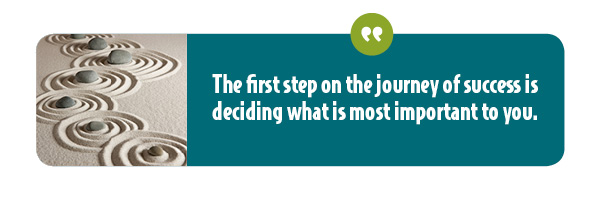There's nothing quite like the enthusiasm of a new goal or beginning—a new year with a clean white page to write on. Or maybe your goal is dropping that extra weight picked up over the winter (hand raised). Or you just starting a new yoga class or hired a trainer at the gym! New and novel wakes up the brain!
But if you're like many, your goals, especially the long-term ones, fizzle out quicker than a lit candle stuck in wet snow. Did you know there are simple brain hacks to break bad habits, stick to goals, and achieve success?
Estimated reading time: 6 minutes
 Most people desire success; few have defined what success actually means to them. And fewer would say they’ve achieved it.
Most people desire success; few have defined what success actually means to them. And fewer would say they’ve achieved it.
What does success mean to you? Who decides you've arrived and are successful?! To have success in any area of life, we need to define what success means to us personally since all of us have different values and goals. And if we have only a vague idea of what it means to us, we can't hope to arrive at that lofty place.
We will never be able to measure how far or how close we are to success if we have not clearly and specifically defined it. But how do we write our definition of success and well-being without determining what's most important to us?
How Do You Define Success?
Common success synonyms are accomplishment, achievement, happiness, a favorable outcome, and prosperity. But more importantly, what does success mean to you?
Have you taken the time to grapple with that question? If you haven’t decided where you’re traveling to, no road map will help. You must know what you want and what success means to you. It is the most important step of all.
Brain Hacks to Achieve Extraordinary Success
 Define what success means to you personally.
Define what success means to you personally.
To some people, success is achieving a financial goal of hefty savings; to some, it’s rising to the top in their careers; to others, success is finding happiness and emotional well-being; and yet to another, it’s meaningful and healthy relationships. We are all unique and therefore, what is important to us is also unique.
No one can achieve success without defining what it means to them.


Take full responsibility for your life and the person you want to be.
Zdravko Cvijetic writes in an article: “Successful people know that they are responsible for their life, no matter their starting point, weaknesses, and past failures.” This statement illustrates a concept that is vital if we are to achieve success.
Taking responsibility for the quality of our life is paramount to any recipe for success.
It’s not enough to dream big; we must take practical actions that move us closer to the fulfillment of our goals and what is important to us. We cannot hope to have success if we blame others for our unhappy life, lack of money, failing relationships, or insufficient opportunities. The greatest leverage we have is making a commitment to ourselves to take full responsibility. This one act is a major game-changer.

Find out what habits work against your success.
Another mistake that’s easy to make is neglecting to examine behaviors that can derail us, prevent us, or at the very least slow us down from achieving our dreams and goals.
In the Entrepreneur article, 10 Bad Habits You Must Eliminate from Your Daily Routine, by Travis Bradberry, “Saying ‘yes’ when you should say ‘no’” is one of those bad habits to surrender. It is tough to know when we need to say no if we haven’t yet defined our burning “YES!”
And if you're a people pleaser, sticking to your own goals can be challenging. Even when we know what's important, if we can't say no to others or set boundaries for limiting habits, it's near impossible to reach our goals or create a life we love.
If you'd like to learn how to break the habit of being a people pleaser so you can focus on success as YOU define it, check out our e-book, "How to Stop Being a People Pleaser."
Once you have clearly and thoroughly isolated what success means to you and know how to get there, you must look at what gets in the way of moving forward. Keeping your attention on your goals and the many milestones to achieve them requires awareness of the obstacles.
Our "bad" habits may be small such as checking our email dozens of times a day or getting frustrated with our employees or watching too much television. However, if the lost time, energy, and opportunities were added up over a ten-year period, those little actions might be what keeps us chained to an unfulfilled life.
So this step asks you to discover what habits are chaining you to a destination you are unconsciously choosing but definitely don't want.

Once you've discovered what success means to you, you've made a decision to take full responsibility, and you've fleshed out those unfavorable habits, the next step is to break down the bigger goal into smaller ones. Just like we can't eat an apple or a watermelon in one bite, we can't accomplish anything all at once. Breaking our bigger vision into bite-size goals allows us to be more effective and prevents us from getting bogged down and overwhelmed.
Related reading: "How Values and Intrinsic Motivation Impact Achieving Goals and Increasing Happiness."
 Enlist the natural way the brain works.
Enlist the natural way the brain works.
 In an earnest desire to accomplish goals and change our lives, many people start way too big. The disadvantage of starting too big is that usually the actions are unsustainable and before we know it, we've defaulted back to our same old ways.
In an earnest desire to accomplish goals and change our lives, many people start way too big. The disadvantage of starting too big is that usually the actions are unsustainable and before we know it, we've defaulted back to our same old ways.
Starting small is key to building success in your daily life. Small is BIG for the brain.
Typically, our enthusiasm causes us to bite off too much. It is far better to take small actions that are sustainable and consistent than actions that are abandoned after a week. New behaviors require consistency. Whether you're a manager seeking success at work, a parent trying to stop yelling when angry, or simply wanting to master a new yoga pose, it's key to start small until you build momentum.
In Heartmanity's blog series, "Building Healthy Brain Habits" you'll discover the keys to success by utilizing the best of brain habits.
 Create a daily routine that supports success.
Create a daily routine that supports success.
You're almost there!
Achieving goals and implementing the keys to success conclude with a daily routine. A successful life is not determined by what we do every once in a while.
Success is forged by what we do consistently.
No matter who you respect or admire in their success if you asked them how they arrived, they'd agree that the pathway was a discipline of daily actions that created the structure for growth personally and professionally.
 Doing the things that matter most every day will get you where you want to go. Design your own habits that lead to the life you desire. Create routines that support you to achieve your goals. Make decisions that guide you closer to the success you desire, even if it's a baby step.
Doing the things that matter most every day will get you where you want to go. Design your own habits that lead to the life you desire. Create routines that support you to achieve your goals. Make decisions that guide you closer to the success you desire, even if it's a baby step.
One step at a time, success is won. One day at a time, fulfill your dreams.
To learn more about our brain fitness programs that empower individuals or personal transformation through our One Year Makeover, contact us at support@heartmanity.com.










